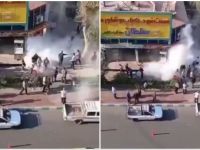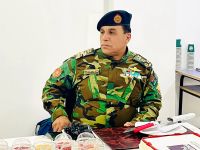Israeli Prime Minister Ehud Barak leaves Saturday for talks with US President Bill Clinton with little hope of ending the spiral of violence in the Middle East that has claimed the lives of more than 200 people.
Barak is due to meet Clinton on Sunday following the US president's inconclusive talks with Palestinian leader Yasser Arafat, who has so far failed to win backing for his demands for a UN force in the occupied territories.
Tensions remained high on the ground as several thousand people marched through the streets of Gaza City for the funeral of one of five Palestinians killed on a "day of rage" the day before that also saw one Israeli killed.
Overnight, the Israeli army reported several shooting incidents in the West Bank, while a roadside bomb exploded near an army patrol near a Jewish settlement in the Gaza Strip, but there were no reports of injuries.
Friday's killings brought the death toll to 202 in six weeks of violence that erupted after the September 28 visit of Israeli opposition leader Ariel Sharon to the al-Aqsa mosque compound in east Jerusalem, a site holy to Jews as well as Muslims whose sovereignty is hotly disputed.
"I am pessimistic about the chances of re-launching the political process with the Palestinians after my meeting with Clinton," Barak said Friday.
"We hope that the escalation won't happen and that the Palestinian leadership will reduce violence. It is clear that we have to find a solution through negotiations, but the situation is fragile and can deteriorate," he said.
The Israeli leader last month declared a "time-out" in the seven year Oslo peace process, and the Palestinians said Friday that Israel was no longer a partner following the army's assassination of a leader of Arafat's Fateh faction.
"The Palestinians can no longer talk of agreements or of a political process after Barak turned his back on accords that have been reached," said Palestinian cabinet member Hassan Asfour.
"I think it is no longer possible to have as a partner a negotiator that is at the same time a killer," he said.
The Israeli army said it killed the Fateh militant, Hussein Abeyat, in a helicopter strike in the West Bank on Thursday because he was on his way to kill Israeli soldiers. Two women bystanders were also killed in the attack.
The Barak-Clinton meeting coincides with an Islamic summit in the Gulf state of Qatar which will be considering recommendations from foreign ministers for all Muslim countries to break off ties with Israel.
The document also threatens to break off relations with any country that transfers its embassy in Israel to Jerusalem or recognizes the holy city as Israel's capital.
The proposal specifically denounces the United States, where leaders have voiced their desire to eventually move the US embassy from Tel Aviv to Jerusalem, which Israel controls but whose eastern sector the Palestinians want as the capital of a future state.
Arafat meanwhile, spent Friday pleading for the United Nations to send in 2,000 armed military observers to protect the Palestinians from Israel.
But Israel strongly opposes the proposal and US Ambassador to the UN Richard Holbrooke said Washington would object to any plan "unilaterally proposed without ever having been discussed by the other side, directly."
After private talks with the UN Security Council's 15 member states, Arafat hinted he may support an alternative idea floated by France for an unarmed observer force.
The Palestine Liberation Organization has stepped back from a planned move towards declaring a separate Palestinian state next week, which Israel had warned would have serious consequences.
The PLO's Central Council would not meet on or before November 15 as it had intended, its chairman Salim al-Zanun told Voice of Palestine radio Friday.
The Central Council decided on September 10 to delay unilaterally declaring statehood, but vowed to meet by November 15 to review the issue -- JERUSALEM (AFP)
© 2000 Al Bawaba (www.albawaba.com)







